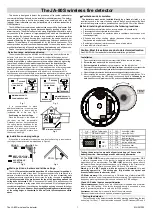
To verify bandwidth
In this test you verify the bandwidth of the oscilloscope by using a constant
amplitude signal generator. The frequency of the signal generator is set to
250 kHz to establish a reference level. Then, the frequency is changed to the
upper bandwidth limit and the level is checked to see if it is 3 dB from the
reference level.
The following procedure is a simple method to check bandwidth. However,
there is a possibility of measurement uncertainty with a constant amplitude
signal generator. If you need a more exact procedure for checking bandwidth
see, "To verify the bandwidth (alternate method)" on page 4–12.
Test limits
HP 54600B and HP 54601B, all channels (
−
3 dB)
dc to 100 MHz
ac coupled 10 Hz to 100 MHz.
HP 54602B
Channels 1 & 2 (–3 dB)
10 mV/div to 5 V/div
dc to 150 MHz
1 mV/div to 5 mV/div
dc to 100 MHz
ac coupled 10 Hz to upper limit of vertical range
Channels 3 & 4 (–3 dB)
dc to 250 MHz.
HP 54603B, all channels (
−
3 dB)
dc to 60 MHz
ac coupled 10 Hz to 60 MHz.
Table 4-5
Equipment Required
Equipment
Critical specifications
Recommended
Model/Part
Constant amplitude
signal generator
100 MHz, Constant amplitude
±
1%
(250 MHz for HP 54602B)
Tek SG503/Tek TM501
Cable
BNC HP
10503A
Feedthrough
50
Ω
, BNC (m) and (f)
HP 10100C
Service
Verifying Oscilloscope Performance
4–10
Summary of Contents for HP 54600B
Page 7: ...vi ...
Page 12: ...1 The Oscilloscope at a Glance ...
Page 28: ...2 Operating Your Oscilloscope ...
Page 69: ...2 42 ...
Page 70: ...3 Using Option 005 Enhanced TV Video Trigger HP 54602B ...
Page 148: ...Exploded view of oscilloscope Figure 4 11 Service Replacing Parts in the Oscilloscope 4 59 ...
Page 153: ...4 64 ...
Page 154: ...5 Performance Characteristics ...
Page 175: ...Glossary 8 ...
















































